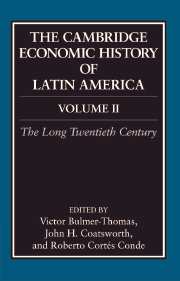Book contents
11 - Education and Social Progress
from Part III - Factor Endowments
Published online by Cambridge University Press: 28 March 2008
Summary
OVERVIEW
Despite more than a century of intermittent progressive policy rhetoric, schools in Latin America still marginalize the children of indigenous groups, of rural populations, and of the poor. This paradox of a resilient conservative school practice and progressive education policy rhetoric is explained by conflict among policy elites, first on the priority of educating the children of the poor at high levels more generally and second on the purposes of schooling, and by the ensuing discontinuities in policy and weak implementation of progressive aspirations.
Because educational results take time (it takes a while to build new schools, to change curricula and print new books, and for teachers to learn new ways), and because the linkages between policy rhetoric and policy implementation and outcomes also take time, the conditions in Latin American educational institutions reflect the tensions between two competing education ideologies and the cumulative influences of past projects. One ideology, a series of progressive ideas and projects, espoused that schools should build an inclusive and democratic social order, whereas another ideology, a series of conservative ideas and initiatives, saw the purposes of schools as supporting an authoritarian and exclusionary social structure. This chapter examines these time lags, tensions, and coexistence of contradictory ideologies in school practice to explicate why education policy implementation often trails policy talk in Latin America, and why short-term victories of progressive views in policy rhetoric had limited consequences for the actual learning opportunities of marginalized children.
- Type
- Chapter
- Information
- The Cambridge Economic History of Latin America , pp. 427 - 480Publisher: Cambridge University PressPrint publication year: 2006
References
- 9
- Cited by



